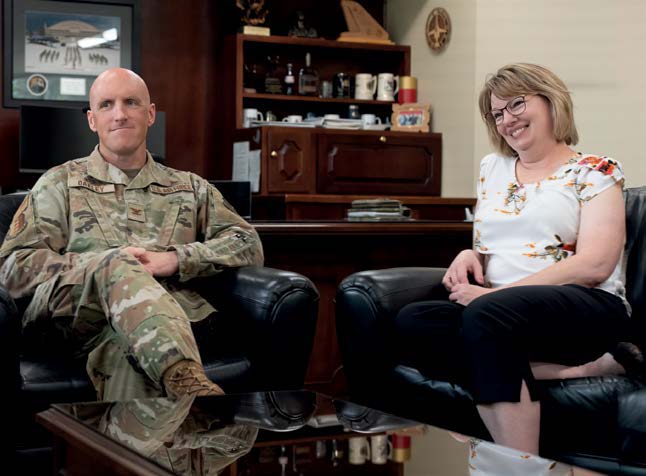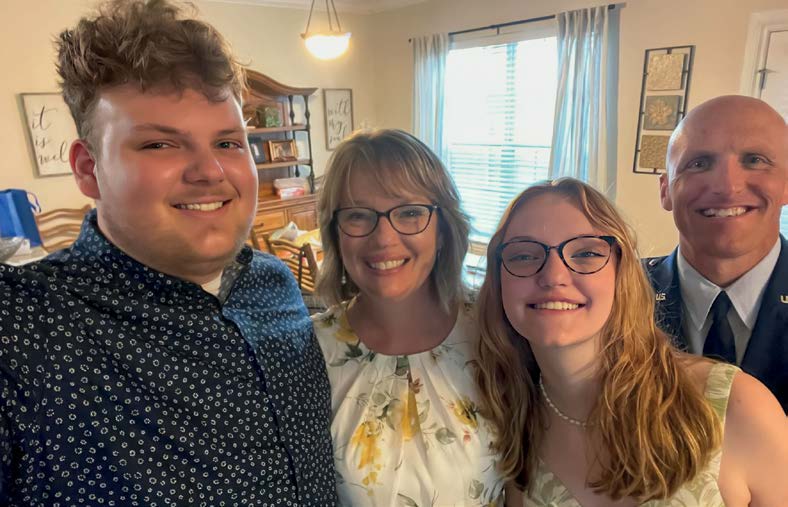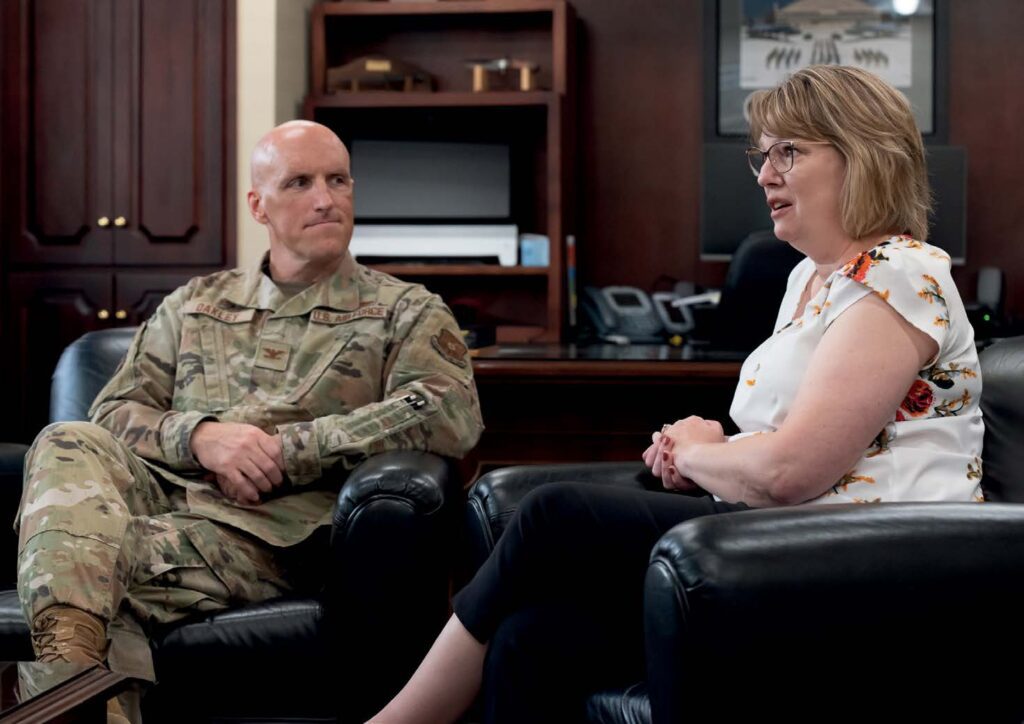Words Kayla Gahagan | Photos Kevin Eilbeck Photography
Grace under fire. If there was a time for it, it would have been halfway into Colonel Derek Oakley’s first year at the helm of the 28th Ellsworth Air Force Base Bomb Wing, the largest B-1 combat wing in the United States Air Force, with more than 8,500 active-duty military, civilian employees, and family members.
On a cold January day, seven months into his first year as Commander, a B-1 Lancer bomber crashed on the Ellsworth runway during landing. All four crew members ejected safely, but the crash added another spinning plate to his tall order as Commander: to prepare combat-ready aircraft, crews and logistics for combat in global missions.
And unique to the job right now – Col. Oakley’s command is during a historic transformation of Ellsworth as it becomes home to the B-21 Raider- a multi-year, billion-dollar project that requires an unprecedented level of security and personnel.
It was all on his agenda that January day.
“The world stops when a plane crashes,” Col. Oakley said.
The military does not.
While Ellsworth personnel spent weeks cleaning the runway, investigating and repairing the plane, “our air crew needed to keep flying,” Col. Oakley said. That meant sending B-1 pilots and planes from Ellsworth to Dyess Air Force Base in Texas to continue working.
While there – another call came. A militia group struck Tower 22, a U.S. military outpost in northeast Jordan, killing three soldiers and injuring nearly 50 others. Ellsworth B-1 bombers took the mission and the U.S. began retaliatory strikes on Feb. 2, hitting sites in Iraq and Syria.
“So we had a plane crash and then we’re preparing the bed down for the B-21 coming to the base and we’re still asked to execute a combat mission,” he said. “It’s amazing the people who stepped into the gap during all of
that. For a couple months, we were just trying to survive.”
Commander Oakley recounted those few months in the greater perspective of his first year alongside his wife, Kelly, who joined him for this interview in his spacious office at the 28th Bomb Wing Headquarters.
The couple spoke candidly about how their life has changed since he took command, what Col. Oakley hopes he accomplished his first year, and how he manages the B-21 undertaking as Ellsworth and the surrounding communities adjust to the intense growth that accompanies it.


B-21 Bed Down
Col. Oakley’s days are a well-orchestrated maze of interviews, phone calls, speech- writing, strategic planning – and if planned well – face-time with airmen. Today he makes quick introductions, slides two camouflage day planners onto the corner of a tidy desk and jokes with the photographer.
He’s efficient, on-task, formal, friendly.
His office bears all the regalia of a nearly three-decade military career – academia, awards, bits and pieces of history. A T-6 airplane wing hangs encased along a far wall and an organized display of dozens of patches, coins and pins carpet cover a table, each one marking a milestone or victory.
Col. Oakley spent half his career flying the B-1 and the other half teaching new pilots.
Flying and teaching both run in his blood and when asked which he favors, he can’t choose one.
He earned a teaching degree before becoming a command pilot with more than 3,400 flight hours in the B-1B, T-38, T-6, and T-37, including 991 combat hours in support of Operation Enduring Freedom. Before becoming Commander, he led the 28th Operations Group at Ellsworth, the largest operational B-1B group in the U.S. Air Force.
He received his commission from the United States Air Force Officer Training School in 2000 and graduated from pilot training at Columbus AFB, Mississippi. He was operationally assigned to the B-1B.
“I was really lucky to get to fly the airplane I wanted to fly,” he said of the B-1, which first came into service in the 1980s as a conventional supersonic bomber. It has been used to support missions in the Asia-Pacific region and Afghanistan. It does not carry nuclear weapons and about 60 remain in service at Dyess Air Force Base in Texas and Ellsworth.
Before he enters his office, there’s a small flurry of activity – a security sweep and a handing over of all cell phones, smart watches and recording devices. They sit on a table outside the room, a reminder of a tension he’s responsible to manage: keep everyone safe, but keep things open.
“Covid caused a little bit of disconnect between us and the community,” he said, because of the level of lockdown. “On day one in this job, I wanted to provide superior customer service for our airmen – get doors open and really put an emphasis on caring about people. We want to get people back on base. We want them to see what we do. There are no aliens behind the fence.”
That will get more complicated as Ellsworth welcomes its first stealth and nuclear capable aircraft. The USAF is counting on the B-21 Raider Stealth Bomber to penetrate enemy airspace with a mix of weapons, including the Long Range Stand Off (LRSO) weapon, the new nuclear missile.
The Air Force unveiled the B-21 Raider at the end of 2022 in a California ceremony, but officials have remained tight-lipped about details of production.
They have confirmed that six B-21 aircraft are currently in flight tests and Col. Oakley said the timeline is right on schedule and production for the aircraft that will end up at Ellsworth is close to starting.
“A nuclear base is a different culture,” Col. Oakley said. “We have to develop that culture and it doesn’t just happen overnight.”
Col. Oakley started the Personnel Reliability Program (PRP) for select personnel to take, which includes new security, vetting and procedures.
The Home Front
His wife, Kelly, is as much of the equation of Col. Oakley’s first year as Commander as his airmen. The Oakleys
are Eastern Iowa high school sweethearts
and they talk in tandem, a rhythm refined by 28 years of marriage, two kids and 14 military moves.
He makes space for her when they rise for photos and quietly sweeps a piece of hair from her forehead before pictures.
They settle into black leather furniture – a living room of sorts – in between a large conference room and his over-sized office desk.
She listens to the talk of bombers and missions, deployments and community growth. A large North Rapid Development map is framed on the wall – a reminder that Ellsworth’s means Black Hills growth. She knows there are supporters and detractors and that decisions made in this office sometimes affect thousands of people, inside and outside the fence.
She’s aware of the weight on her husband’s shoulders each day.
When recounting the January plane crash, she remembered that Derek and his team operated for days on little sleep, cold pizza and donuts. She brought a meal to the office, and when he did make it home, she focused on one thing.
“I did a lot of just listening,” she said. “I want him to be able to process whatever he needs to process. He always puts others before himself and I want him to have someplace to debrief if he needs it.”
Kelly has acclimated to military life. She homeschooled their kids, moving them to new locations nearly every two years. They anticipated the next move would be away from Rapid City so it was a surprise – and a major life change – when he took command of Ellsworth.
Most immediately, the calendar filled up. And though she doesn’t like to be called First Lady, he teased her today and said that it fits. First listener at home. First at his side for events. There’s no pressure from him though, he said.
“We had a good conversation when I accepted the position,” he said. “I told her to do what she wanted to do – there are times when she’s busy and can’t come to something and that’s OK.”
Kelly currently serves as the outreach team coordinator at Fountain Springs Church.
“There are some non-profit events for her work and I’m ‘Kelly’s husband’ and I’m not the wing commander,” he said. “It’s really unique that we both get to be out in the community in different ways.”
There’s one thing that hasn’t changed over the years – the love for their children. Their daughter Delanie, 18, lives at home while attending Black Hills State as a freshman. Their son, Tyler, 21, is a senior at Black Hills State and lives in Spearfish.
“Even after they graduate, you’re still a mom,” Kelly said.


It’s the first time their kids have been able to stay in one location longer than a couple years. It’s the bittersweet experience of military life. If she could pass on advice to new servicemen and women and their families, it is this: life goes on.
“You have to realize your life continues regardless of where you’re living,” she said. “We pick up our family and plant somewhere else, but the hobbies, activities, school and work, it all continues. It’s so important to take initiative where you are and get plugged in.”
And not only plug in – but explore. “People travel to these places, but we get to experience these places,” she said. “One of my regrets is we didn’t always take advantage of what was around us. Our country is so diverse.”
Derek said the flip side to moving often is the opportunity to see the world. “Our kids have seen every zoo, museum, attraction,” he said, laughing. “The ability to take normal vacations really doesn’t exist. For many military members, our vacations are going back home to see family.”
He hopes to teach his airmen not to just be good soldiers, but pursue health in every area of their lives. He encourages them to get off the base, visit other communities, enjoy the Black Hills, get involved. “They spend a lot of time on base,” he said. “Kelly and I love the Black Hills, the trails, the attractions, but the most important thing, are the connections you make when you get off the base.”
The couple has lived all over the U.S. – from the deep south to southern California to New York. Rapid City genuinely cares about its military families, Kelly said. “They’re proactive,” she said.
“There are wonderful people and organizations that make things happen.”
Oakley carries challenge coins in his uniform pants pocket – much like the row he has on his display desk.
He has his secretary intentionally schedule time on base for him to meet with airmen or make unexpected stops where they work. He hands the coins out, one by one, when he witnesses an airmen doing something well.
“A little encouragement and recognition goes a long way in driving good behavior,” he said. “I can’t teach, coach and mentor from behind my desk.”
It’s the mentoring and coaching DNA that runs in his blood, and he can’t give that up even with his new responsibilities. It lines up with a long-term vision to be the best, and to train from the ground up.
“My motto is ‘win today, dominate tomorrow,’” Oakley said. “We need to be able to win today, and though we never want to go to war, we will defend our freedom if we are asked to do it. It’s a mindset of doing better every day.”
That’s why it’s important, he said, to keep investing in each airman and their families.
“It’s all about teaching, coaching, mentoring,” he said. “I have the best job in the Air Force.”

